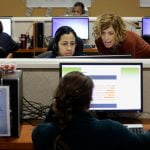You’re sick. Your head is pounding, the sunlight is too bright, you’re nauseated and vomiting and feeling very sorry for yourself.
What do you do? You grab your smartphone and through blurred vision you Google ‘migraine’.
When we’re sick, when our children develop a strange red rash or when we catch a news story about a lactose intolerant cow, we start Googling, and Google knows it knows it.
For the first time Google has launched health condition cards in Australia, designed to answer users’ health-related questions, queries and curiosities.

One in every 20 Google searches are health-related, according to the tech giant. Google wants to make sure users are getting accurate information, said project manager Isobel Solaqua.
“Starting today when Australians search for common health conditions, such as asthma, they will start to see health cards appear in their search results,” Ms Solaqua said.
For instance, users searching for coeliac disease, measles or pneumonia will find an outline of the conditions, symptoms, diagnosis, treatment pathways and prevalence.
It could be a potent antidote to dodgy websites and charlatan health gurus peddling junk health advice and treatments that are at best ineffective and at worst dangerous.

“These health cards are meant to provide basic information about health conditions and a framework to help users dive deeper across the web and do deeper research as well as to have more informed conversations with their doctors,” Ms Solaqua said.
Some health cards are accompanied by illustrations created by licensed medical illustrators.
The feature was developed with the expertise of US-based medical doctors led by Google’s Dr Kapil Parakh, a cardiologist, and Mayo Clinic doctors who compiled, curated and reviewed the most relevant and accurate health facts.
No pharmaceutical company or other commercial healthcare provider was involved in creating the cards, and does not recommend specific medications, Ms Solaqua said.
It was important the health cards gave people information their doctors would want their patients to see, she said.
The health cards are sources of information only, Ms Solaqua stressed. They are not a diagnostic tool and cannot replace a face-to-face consultation with a flesh-and-blood doctor. It’s advice that is clearly visible on the cards.
“Everybody should be concerned when people are not getting the healthcare they need or have a right to access,” Ms Solaqua said.
“What we can see is that people are going to the internet to look for information.
“Instead of trying to pretend that that isn’t a problem and that people aren’t finding bad information on the internet, what the health cards are meant to do is provide accurate and reliable information created in a partnership with medical doctors and to make sure there is a source of information online that people can trust,” she said.
The Australian version mimic the US health cards launched in February 2015. But Google hoped to partner with Australian groups to tweak them to better fit the local health scene, and Australia-specific prevalence data, Ms Solaqua said.
The cards had been well received by US clinicians, who often downloaded the health cards to present to their patients, she said.
The feature’s success is in stark contrast to the failed Google Health venture, an online personal health record system launched in 2008 that didn’t catch on.
Australian doctors are cautiously welcoming of Google’s forays into the health space.
A NPS Medicinewise survey suggested three in five Australians used internet searches to avoid seeing a doctor. That proportion rose to 80 per cent among 18-34 year olds.
“There is a lot of potential here,” said Dr Nathan Pinskier, chairman of the Royal Australian College of General Practitioners’ e-health and technology committee.
“There is no question people need to be able to access reliable health information. The question becomes what makes a difference to patient health at the end of the day?” he said.
There was the potential for anxious patients to dismiss a symptom that may indicate a serious health problem after a quick Google search has allayed their concerns. On the flip side, their Googling could heighten their anxieties, Dr Pinskier said.
“We just don’t know. We need to have a watch-and-wait approach with these things,” he said.
Dr Pinskier reiterated Google’s stance.
“Nothing beats face-to-face consultations with medical practitioners,” he said. “It’s what we’ve been trained to do.”
[Source:-The Sydney morning herald]

